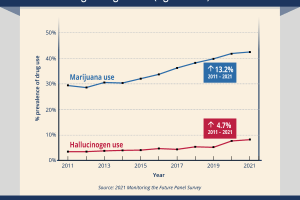Highlights
Image

©Getty Images/Maskot
- MDMA, also called Molly or Ecstasy, is a lab-made (synthetic) drug that has effects similar to stimulants like methamphetamine. Some researchers and organizations consider MDMA to be a psychedelic drug because it can also mildly alter visual and time perception.
- MDMA’s effects may include feeling more energetic and alert and having an increased sense of well-being, warmth, and openness toward others.
- However, MDMA can also cause a number of negative health effects. For example, while deaths from MDMA are rare, overdoses can potentially be life threatening—with symptoms including high blood pressure, faintness, panic attacks, and in severe cases, a loss of consciousness and seizures.
Latest from NIDA
Marijuana and hallucinogen use among young adults reached all time-high in 2021
|
NIH-supported study also found past-month vaping levels rebound after early pandemic drop.
Find More Resources on MDMA
- Find basic information from MedlinePlus, a service of NIH’s National Library of Medicine (NLM).
- Learn more about MDMA from the Drug Enforcement Administration (DEA).
- Read more about MDMA research from the National Institutes of Health.
